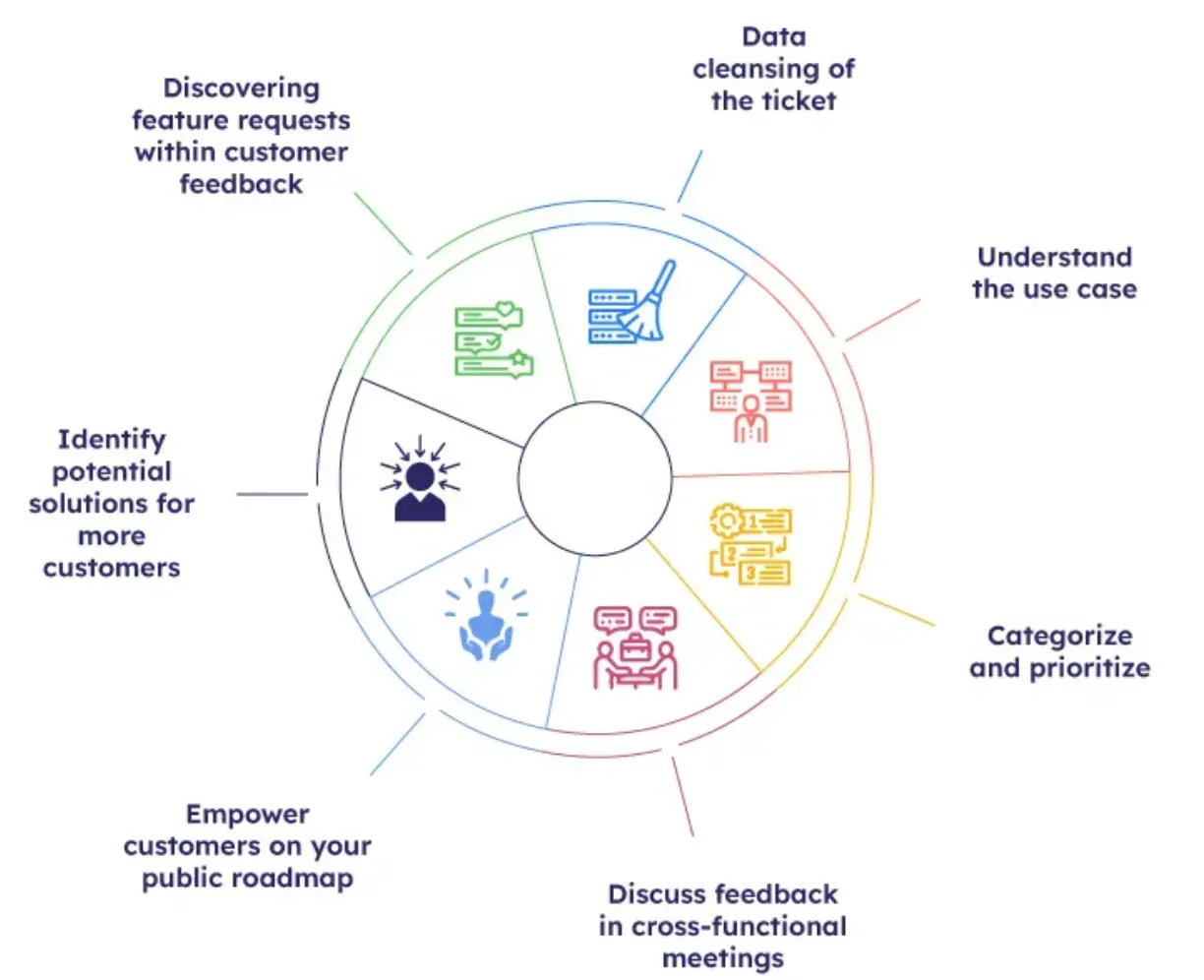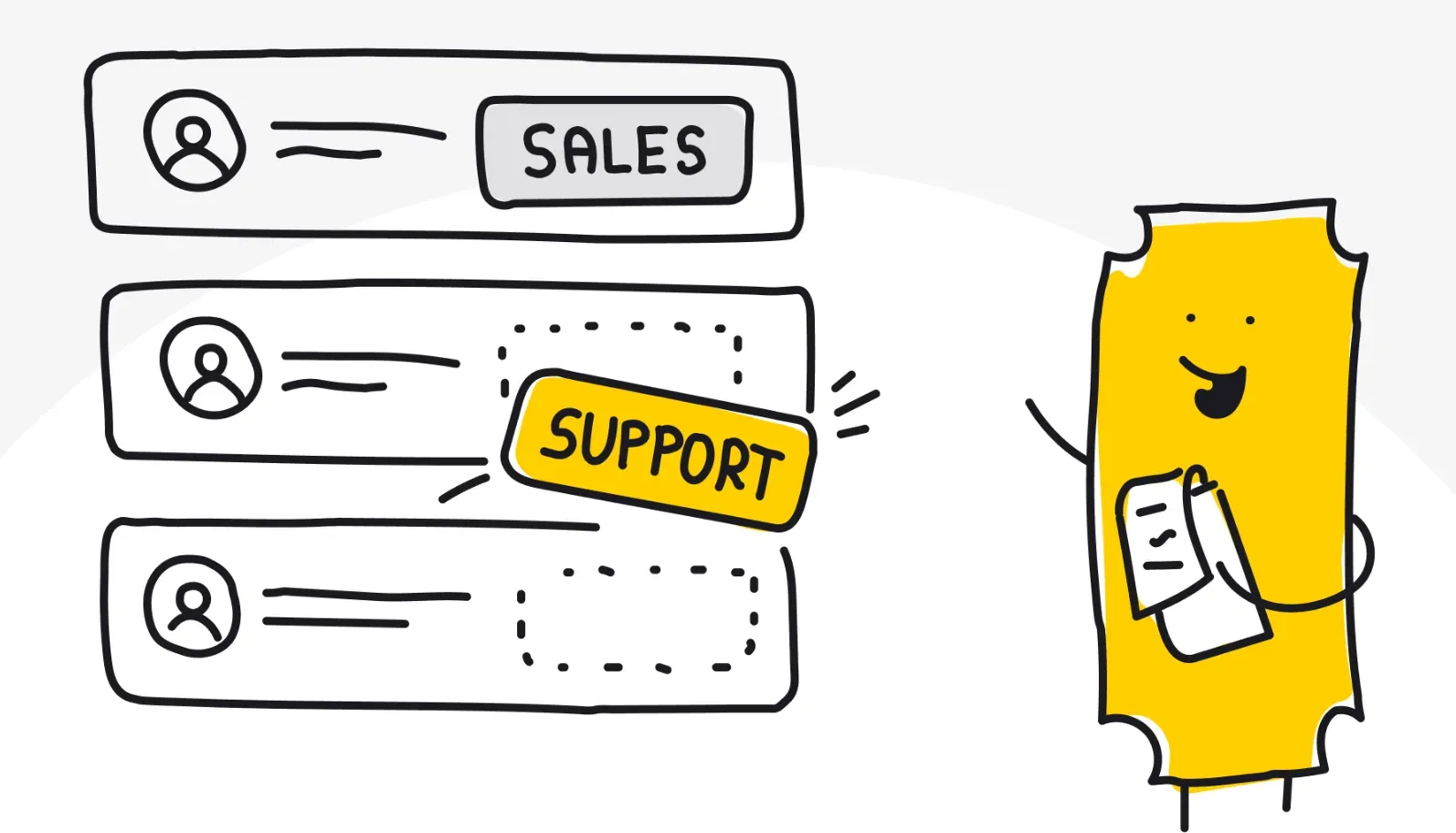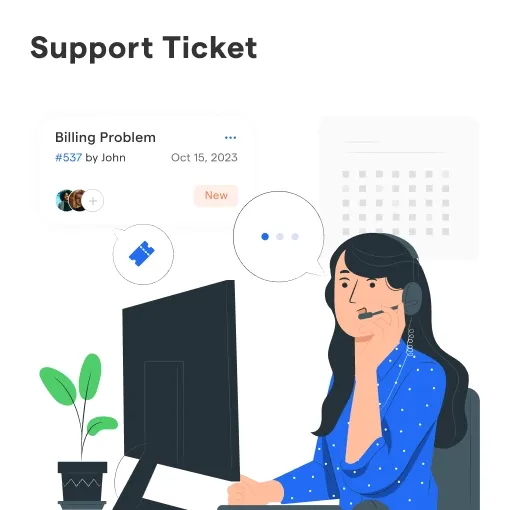WHAT is a Support Ticket?
A support ticket, often known as a trouble ticket, is a formal record of a customer's issue or request. Generated via customer engagement channels, it exists to track the detection, reporting, and resolution of the customer's problem.
Components of a Support Ticket
A support ticket typically contains several crucial elements like a unique ticket ID, customer's name, contact information, problem description, ticket status, priority level, and assignment info indicating the staff handling the ticket.
Types of Support Tickets
Support tickets can be categorized based on the issue type mentioned by the customer: technical tickets related to software or hardware problems, account-related issues, billing queries, or product inquiries, among others.
Lifecycle of a Support Ticket
Support tickets generally undergo several stages: creation, prioritization & categorization, assignment, troubleshooting, resolution, and closure. Each stage represents a step towards fully resolving the customer's issue.
WHY are Support Tickets Essential?
With a firm grasp of what a support ticket is, we should now explore why they play such a vital role in customer support.

Orderly Resolution of Issues
Support tickets allow organizations to manage and address customer issues systematically, ensuring no problem falls through the cracks.
Improved Customer Satisfaction
By ensuring timely and appropriate responses to customer complaints or queries, ticketing systems significantly enhance overall customer satisfaction.
Performance Tracking
Organizations can track the performance of their support teams, identify common issues, evaluate response times, and improve their services based on insights from support tickets.
Resource Management
Support tickets enable a more efficient allocation of resources. Tickets can be assigned to agents based on their availability or skill-set, fostering productivity and balance in the workforce.
WHO uses Support Tickets?
Engaging with the various actors in the world of support tickets provides relevant insight into the whole ecosystem.
Customers
For customers encountering issues with products or services, creating a support ticket is often the first step toward finding a solution to their problem.
Support Agents
Support agents are the front-line heroes who handle and resolve the issues lodged in support tickets, ensuring customer satisfaction.
Customer Support Managers
These managers oversee the operations, track metrics, and ensure quality in resolving customer support tickets.
Organizations
Businesses across industries value support ticketing systems as powerful tools for delivering effective customer support, gaining insights about customer problems, and improving overall service quality.
WHEN are Support Tickets Used?
Knowing when support tickets come into play provides savvy understanding on their role in different scenarios.

During a Customer's Issue
Whenever a customer encounters an issue with a product or service, a support ticket is established to track the problem till resolution.
During Prioritization of Issues
Support tickets are crucial when prioritizing issues based on their severity, helping address critical problems on a priority basis.
To Measure Performance Metrics
Support tickets form the basis for calculating various performance metrics such as First Response Time (FRT), Time to Resolution (TTR), and Customer Satisfaction (CSAT) scores.
During CRM Integration
Support tickets get consolidated with CRM systems, achieving an integrated view of the customer, which is beneficial when addressing personalized and complex customer issues.
WHERE are Support Tickets Used?
To truly harness the power of support tickets, one must be aware of their varying use-cases across different platforms and business functions.
In Customer Support Platforms
These platforms employ support tickets to streamline customer issues, inquiries, and requests, ensuring nothing slips through the gaps while offering service.
Across Various Business Functions
While predominantly used by customer support, various functions, including IT, HR, and facilities management, also use support tickets to manage internal queries and issues.
Across Various Industries
From tech giants and small businesses to educational institutions and government departments, support tickets find use across organizations of all sizes and industries for effective issue management.
In eCommerce Operations
eCommerce businesses heavily rely on support tickets to resolve customer queries related to orders, shipping, payments, and more, delivering an unmatched shopping experience.
HOW are Support Tickets Managed?
Looking at the processes behind managing support tickets allows us to appreciate the complexity and significance of these powerful tools.

Initiation of a Support Ticket
When a customer encounters an issue, they can initiate a support ticket. This can occur through various channels, such as email, phone calls, live chats, or directly through the company’s support portal.
Assignment of a Support Ticket
The incoming tickets are sorted, categorized, prioritized and then assigned to the appropriate support agents based on their availability and area of expertise.
Resolution of a Support Ticket
The assigned agent dives into solving the issue. This process may involve correspondence with the customer, investigation of the problem, or assistance from other agents or knowledge databases.
Closure of a Support Ticket
Once the issue is successfully resolved, the agent closes the ticket with a record of the problem and the solution. The customer gets notified about the problem resolution, often with an invitation to provide feedback.
Frequently Asked Questions (FAQs)
How do you create a support ticket?
To create a support ticket, you can typically reach out to our team through email, chat, or our dedicated support portal. Provide a detailed description of your issue, and we'll start working on it.
How long does it take to receive a response to a support ticket?
We strive to respond to support tickets as quickly as possible. Our average response time is within 24 hours, but please note that response times may vary depending on the complexity of the issue.
Can you track the progress of my support ticket?
Absolutely! Once you've created a support ticket, you'll receive regular updates on its progress. Our team will keep you informed about any developments or resolutions related to your issue.
What Does a Support Ticket’s Status Mean?
The status of a ticket (Open, Pending, Solved, and Closed) represents the current stage of the problem addressed in the ticket.
How are Support Tickets Assigned?
Support tickets can be manually assigned by a manager or automatically distributed using algorithms in ticket management systems.


